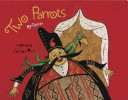K-Gr 3—In a story inspired by Rumi, a 13th-century Persian poet, a wealthy Persian merchant decides to buy a parrot he sees in a friend's shop. He gives the bird the best cage, food, and treasures, but it seems sad and refuses to talk. The merchant is a generous man, and before leaving on a trip to India, he asks each of his servants what they might like as a gift. He also asks the parrot, who replies that he would merely like the merchant to give a message to his parrot friend that "I would love to see him, but I can't because I live in a cage." The merchant promises to deliver the message. The parrot in India, upon hearing the message, begins to tremble and falls down dead. Sadly, the merchant returns home and tells his parrot about the friend's demise, and the merchant's parrot also falls down dead. When the merchant removes him from his cage to hold him, the bird flies off into the garden. "'This is the trick that my friend taught me. He showed me that I could only regain my freedom by playing dead.'" The wise merchant has learned a valuable lesson, and he and the parrot became good friends, with the bird living freely in the garden. Illustrated in bright, bold colors, this tale is delightful. The depictions of the merchant and his generous moustache are outdone only by his elaborate traditional costume, complete with wide-legged silk pants, a flowing robe, and tall, fluted hat. Comical expressions and lively action will keep children interested as they consider the tale's message.—
Carol Connor, Cincinnati Public Schools, OHThough he lives in a golden cage and is well cared for, a pet parrot longs to be free. After the parrot escapes, his owner, a rich merchant, realizes that "Freedom is more important than food and water and all the wealth in the world." The Rumi-inspired story is well translated, and Iranian artist Rashin's illustrations are bold, lusciously textured, and, at times, comical.





Be the first reader to comment.
Comment Policy:
Comment should not be empty !!!